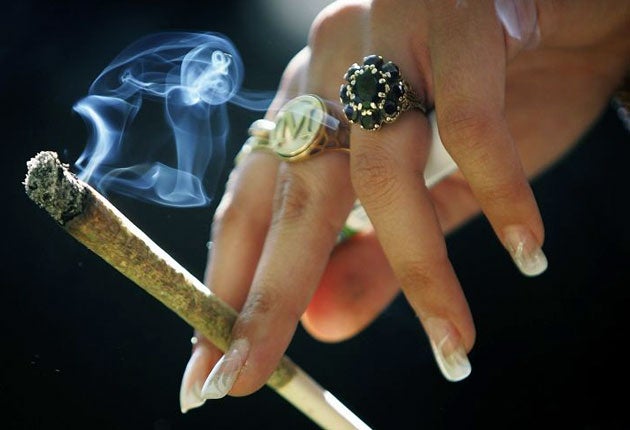The world map of cannabis
Study demonstrates the extraordinary scale of the drug's global popularity

Your support helps us to tell the story
From reproductive rights to climate change to Big Tech, The Independent is on the ground when the story is developing. Whether it's investigating the financials of Elon Musk's pro-Trump PAC or producing our latest documentary, 'The A Word', which shines a light on the American women fighting for reproductive rights, we know how important it is to parse out the facts from the messaging.
At such a critical moment in US history, we need reporters on the ground. Your donation allows us to keep sending journalists to speak to both sides of the story.
The Independent is trusted by Americans across the entire political spectrum. And unlike many other quality news outlets, we choose not to lock Americans out of our reporting and analysis with paywalls. We believe quality journalism should be available to everyone, paid for by those who can afford it.
Your support makes all the difference.It is 40 years since cannabis unleashed the "flower power" revolution of the 1960s, encouraging a generation in Europe and the US to "make love not war". Young people at the time hoped their legacy would be world peace. Instead, it has turned out to be a world of fuzzy dope-heads.
In the intervening decades, the drug whose intoxicating effects have been known for 4,000 years has been increasingly adopted by adolescents and young adults across the globe.
Today, an estimated one in 25 adults of working age – 166 million people around the world – has used cannabis to get high, either in ignorance or defiance of its damaging effects on health. Now, the extraordinary popularity of the drug is posing a significant public health challenge, doctors say.
Writing in The Lancet, Wayne Hall of the University of Queensland and Louisa Degenhardt of the University of New South Wales, Australia, say cannabis slows reaction times and increases the risk of accidents, causes bronchitis, interferes with learning, memory and education and, most seriously, may double the risk of schizophrenia. Yet these effects have failed to dent its popularity.
"Since cannabis use was first reported over 40 years ago by US college students, its recreational or non-medical use has spread globally, first to high- income countries, and recently to low-income and middle-income countries," they say.
Citing figures from the UN Office on Drugs and Crime for 2006, they say cannabis use is highest in the US, Australia and New Zealand (where more than 8 per cent of the population indulge), followed by Europe. But because Asia and Africa have bigger populations, they also have the highest proportion of the world's cannabis users, accounting for almost a third (31 per cent) and a quarter (25 per cent) respectively.
Use of cannabis among young people rose strongly during the 1960s and 1970s, peaking in the US in 1979. There was then a long decline until it increased again in the 1990s, before levelling off once more since 2000. In Britain, Australia and New Zealand, cannabis use has been falling for several years, but it is thought to be rising in Latin America and several countries in Africa.
The typical user smokes their first joint in their mid-teens, with use peaking in the mid-20s. The habit then declines steeply as young people move into jobs and discover they have to get up in the morning. Marriage and babies accelerate the decline. About one in 10 of those who ever smoke a joint become regular daily users, with 20 to 30 per cent using the drug weekly. Regular users are also more likely to use other illicit drugs, including heroin and cocaine, lending support to the theory that "soft" drugs act as a "gateway" to hard drugs. But the authors admit this supposed link "remains a subject of considerable debate".
However, they add that the ill effects of cannabis are modest when compared with the damage done by alcohol, tobacco and other illicit drugs. In Australia, it accounted for just 0.2 per cent of the total burden of disease.
Join our commenting forum
Join thought-provoking conversations, follow other Independent readers and see their replies
Comments